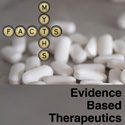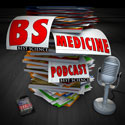Episode 35: Information on older drugs from an even older doctor
In this first episode of the New Year (Episode #35) we review nine (not ten) old drugs that should, in most circumstances, still likely play an important role in your day-to-day prescribing and recommendations. Dr Robert Rangno again joins us for this episode and provides us with some great clinical experience and some mediocre humour. Mike and James, as usual laugh about a variety of things that in hindsight really aren’t all that funny.
Show Notes
Chlorpheniramine
1) Editorial on antihistamines
2) Tolerance to the sedative effects of 100 mg of diphenhydramine occurs within 3 days
J Clin Psychopharmacol 2002:22:511–15
Thiazides
1) ALLHAT JAMA 2002;288:2981-97
2) ACE inhibitors no better than thiazides in diabetics
Arch Intern Med 2005;165:1401-9


Spironolactone
1) RALES/CHF study New Engl J Med 1999;341:709-17

2) Spironolactone for resistant hypertension
AJH 2003;16:925–30 Journal of Hypertension 2007;25:891-4
3) Polycystic ovarian disease
J Clin Endocrinol Metab 2004;89:2756-62
Reserpine
1) Potentially useful agent
Clin Pharmacol Therap 1996;60:368–73
2) Treatment of diastolics of 115-129 mmHg – VA Study JAMA 1967;202:1028-34 (NO LINK – Archived)
Amoxicillin
1) Once daily amoxicillin for Strep throat
Arch Disease Childhood 2008;93:474-8
Doxycycline
1) No appreciable resistance to doxycycline, including pneumococcus
2) Community acquired MRSA
Antimicrob Agents Chemother 2007;51:2628-30
Clin Infect Dis 2005;40:1429-34
3) Low dose (20 mg twice daily) for acne
Sulfa drugs
Allergy to penicillin increases your risk of reacting to sulfa drugs
Nitrofurantoin
Still good for bladder infections
British Journal of General Practice 2002;52:729-34
Listening to this episode is for premium podcast members only. If you already have a membership, login to your account. If you aren't yet a premium subscriber, sign up today!


